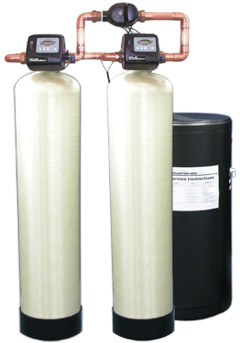Just like the question about salt based vs. salt free water systems, the question of what the difference is between a softener or filtration system is something I come across a lot, and you can be forgiven for not quite understanding which type will work best for you.
Throughout my website I have done my best to offer the best reviews on what I believe is a good cross section of both water softeners and filtration systems. However, I’m not just about giving you the opportunity to find a product that will end your “in-house water woes”, I’m also about making sure you’re armed with all the information before you hit a purchase button. For that reason, in the following few words I’m going to explain the difference between both systems and who they might suit best.
Water Softeners

Primarily, these products are designed to make hard water soft. Hard water tends to be more common in inner city areas or places where there is often hot weather, low rainfall and a high mineral content in the soil.
You will know if your water is hard because you’ll find those horrid white deposits inside your dishwasher or other appliances that use water. If you’re not sure just take a look inside your kettle. If the element is covered in something that looks like dirty wet chalk, the chances are you have hard water.
Hard water contains two main elements: Magnesium and Calcium.
These are what cause the build-up of what’s known as lime-scale on all your surfaces and inside your pipes, so these are the elements water softeners treat.
Water softeners work in two ways.
- They will completely remove both of these elements before water is run through your system.
These are the salt-based water softeners. - They will neutralize these elements by way of electro-magnetic waves before the water comes out of your faucet.
Since these do not completely eliminate the hardness minerals from the water, they are also called water conditioners. However, for most applications these will do.
You can find more information about the two different types here, but in both cases the end result is softer water that leaves little or no residue behind, which helps prolong the life of your appliances and the plumbing in your home. You will probably find it tastes different as well.
Water Filtration

These systems are a different ball game altogether. There are various technologies on the market used to remove contaminants in your water, and there is a whole host of them that could be hiding in that glass you’ve just poured from your faucet. If you’re interested in finding out more about these, take a look at my information page on water contaminants.
Again, it does depend on where you live. Those of you that have your water sourced from a well may well need a more robust filtration system than those of you that don’t, and there is a reason for this. Think about what seeps into the soil around us each and every day? Pesticides from farm land or even your own garden can contaminate the water leading into your home. Paint thinners, gasoline additives and all manner of other chemicals can also make their way into your system.
Of course, there are very strict codes to be followed in the US when providing drinking water to any building, but because some contaminants are in such small quantities they can still get into your supply.
Manufacturers that design water filters make sure the water that comes out of your faucet is free of these. One great example is the iSpring 75GPD 5-Stage Reverse Osmosis Water Filter, which in my opinion is one of the best on the market.
So Which Is It?
Well, as usual I leave the choice up to you. There are water filtration systems on the market (like the one mentioned above) that will reduce the amount of calcium and magnesium from your water, so it will make it softer. If you don’t have a problem with hard water, perhaps a filtration system will work best for you and make water from your tap drinkable again.
